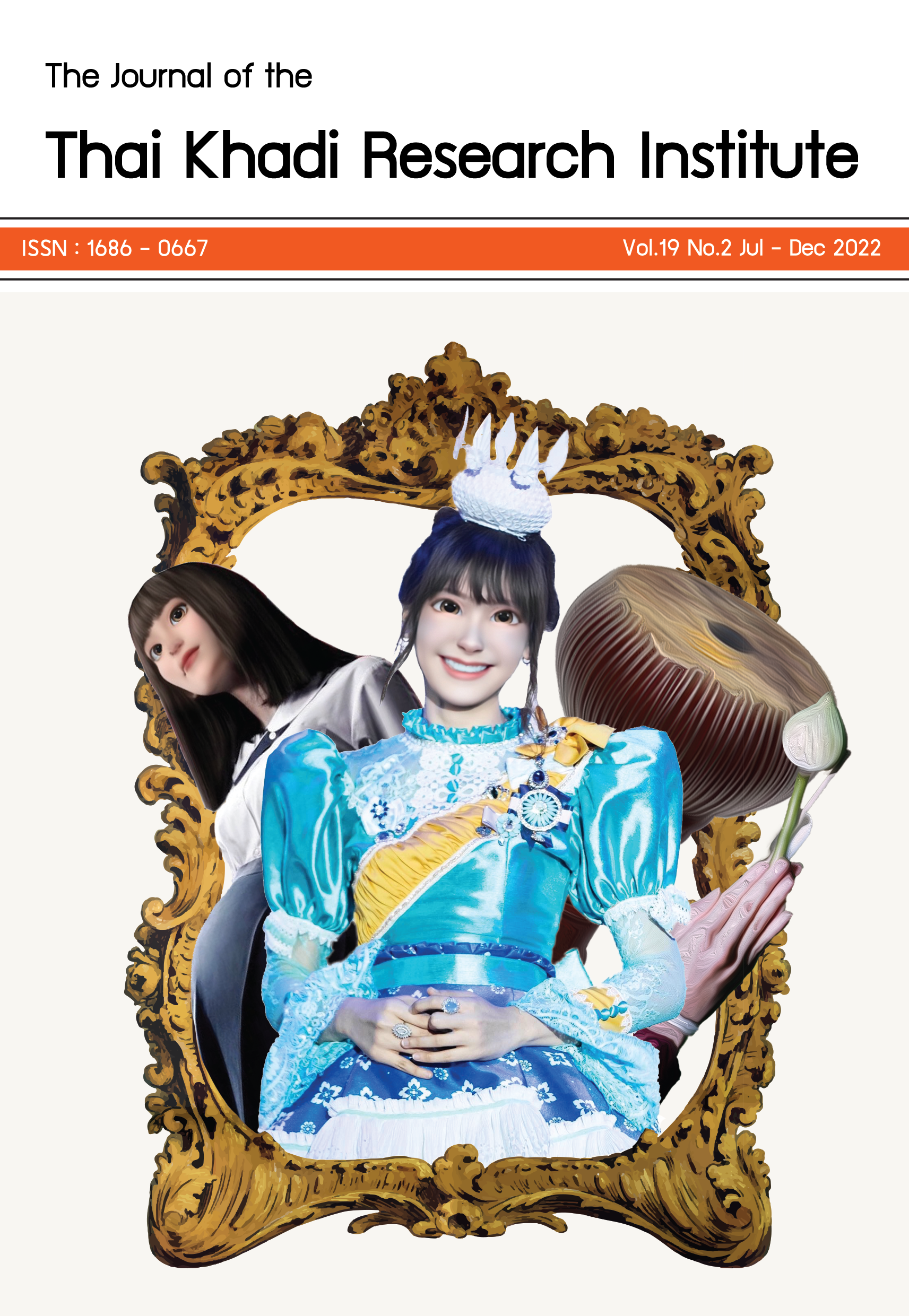How to Apply a Cultural Dimension for Supporting Community Tourism of Ban Huai Wai Phatthana, Buriram Province
Main Article Content
Abstract
This research aims to apply a cultural dimension to community tourism development at Ban Huai Wai Phatthana, Buriram Province and to assess the impact of tourism on the community. The study uses community–based research (CBR) methodology. Data was collected from in - depth interviews, focus group discussion, community potential analysis, participant observation, documents and information retrieval. Key informants are community research volunteers, community leaders, development monks, villagers, elderly people, and local government officials, totaling 255 persons. The results reveal that, to develop a sustainable cultural tourism, certain activities need to be undertaken. These include: 1) in cultural dimension, the development of Ban Nong Don water resource to be an eating out and market place as well as a tourist site, and the revival of ghosts watching movies legend and the local wisdom of lowing water for consumption; 2) in public relations, the use of signposts to indicate the direction of tourist sites, the design of community web page, and the promotion of tourism activities in web page in provincial level; 3) in management, fund raising and money allocation, and prohibition of any activities adverse to tourism; and 4) unity in the community, with people co - operating in tourism development.
Tourism has positive impacts on community in several aspects, including society, culture, economy, and environment. For instance, it builds careers and generates income to the local population. More importantly, it creates co - operation among public sectors, academic institutions, private sector, and the locals for community sustainable development.
Downloads
Article Details

This work is licensed under a Creative Commons Attribution-NonCommercial-NoDerivatives 4.0 International License.
There is no charge for paper processing and publication. Once the paper is under peer-review process, however, if the paper is withdrawn for any reason the author will be responsible for the expense of 3,000 Baht occurred in the review process.
References
Bunsirichungrath, P. (2015). หลักการพัฒนาความฉลาดทางสังคม [Strategies for the Development of Social Intelligence]. Bangkok: Chulalong korn University.
Chidchops. (2016). บุรีรัมย์ที่ระลึกงานพระราชทานเพลิงศพคุณแม่ละออง ชิดชอบ [Commemorating the Cremation Ceremony of Mae La - ong Chidchob]. n.p.
Department of Community Development, Ministry of Interior. (2018). คู่มือการขับเคลื่อนการดำเนินงานโครงการชุมชนท่องเที่ยว OTOP นวัตวิถี [A Manual of the Operation of Community Tourism OTOP Innovation Project]. Bangkok: Department of Community Development, Ministry of Interior.
Document Processing and Archives Committee. (1999). วัฒนธรรมพัฒนาการทางประวัติศาสตร์ เอกลักษณ์และภูมิปัญญาจังหวัดบุรีรัมย์ [Culture, Historical Development, Identity, and Wisdom in Buriram Province]. Bangkok: Fine Arts Department, Ministry of Education.
Jitchinakun, K. (2002). คติชนวิทยา [Folklore]. Bangkok: Odeon Store.
Kongdit, S., Promsilp, W., Rattanapongthara, T., Ransameesuk, J, and Watthanee, T. (2017). รูปแบบและกิจกรรมที่เหมาะสมกับการท่องเที่ยวนิเวศเกษตรอย่างมีส่วนร่วมของชุมชนสามเรือน จังหวัดพระนครศรีอยุธยา [Forms and Activities Appropriate for the Participatory Ecological Agriculture Tourism of the Sam Ruean Community, Phra Nakhon Si Ayutthaya]. Area Based Development Research Journal, 9(4), 314 - 326.
Manasan, P. (2017). ชนะอย่างไรในยุค 4.0 (LEARN & CHANGE FAST IN 4 .0) [(LEARN & CHANGE FAST IN 4.0)]. Bangkok: SE - Education.
Office of the National Economic and Social Development Board. (2017). แผนพัฒนาเศรษฐกิจและสังคมแห่งชาติ ฉบับที่ 12 (พ.ศ. 2560 - 2564) [National Economic and Social Development Plan No. 12 (2017 - 2021)]. Bangkok: Office of the National Economic and the Social Development Board.
Pinanratchathon, S. (2019). วัดคงคาราม จังหวัดราชบุรี: คุณค่าของทุนทางวัฒนธรรมที่จับต้องได้ และแนวทางส่งเสริมเป็นแหล่งเรียนรู้วัฒนธรรมชาวมอญในประเทศไทย [Khongkharam Temple, Ratchaburi Province, Value of Tangible Cultural Capital and Direction for Promoting the Temple as a Learning Center of Mon Culture in Thailand]. The Journal of the Thai Khadi Research Institute, 16(2), 121 - 158.
Puang-ngam, K. (2008). การจัดการของชุมชนและท้องถิ่น [Community and Local Self - Governance]. Bangkok: Bophit Printing.
Romrattanaphan, W. (2008). ทุนทางสังคม: กระบวนทัศน์ใหม่ในการจัดการสิ่งแวดล้อม [Social Capital: New Paradigm in Environmental Management]. Bangkok: Thammasat University.
Suwanvijit W. (2019). กิจกรรมการท่องเที่ยวเชิงสร้างสรรค์สำหรับกลุ่มนักท่องเที่ยวสูงอายุพื้นที่ชุมชนลุ่มน้ำคลองป่าพะยอม - คลอท่าแนะ จังหวัดพัทลุง [Creative tourism activities for elderly tourists in the basis community of khlong pa payom - khlong ta nae,phattalung provine]. Area Based Development Research Journal, 10(6), 514 - 529.
Tancharoen, S. (2016). การท่องเที่ยวชุมชนโดยชุมชนเพื่อชุมชนและท้องถิ่น [Community Tourism by Community for Community and Local]. The 3rd National Academic Conference: Southeast Asian Interdisciplinary Studies.
Tahom,U. Wandee,P. and Dhurata, S. (2015). ทุนทางวัฒนธรรมและภูมิปัญญาท้องถิ่น เพื่อสร้างการมีส่วนร่วมในการจัดการทรัพยากรธรรมชาติและสิ่งแวดล้อมของชุมชนบ้านตามา จังหวัดบุรีรัมย์ [Cultural Capital and Local Wisdom for Promoting Participation in Natural Resources and Environment of Ban Tama Community, Buriram Province]. Journal of Environmental Management, 11(2), 45 - 59.
Tanapornpan, R. (1996). ทุนวัฒนธรรม [Cultural Capital]. Bangkok: Ply Place.
Sirisamphan, T. (2018). ยุทธศาสตร์ชาติอนาคตไทย [National Strategies for the Future of Thailand]. National Economic and Social Journal, 55(Special issue July - December), 6 - 17.


